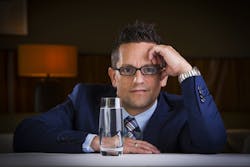Water Into Wine
In every drop of water, Martin Riese detects a distinct taste, scent and appearance. As the only certified water sommelier in the U.S., Riese uses his unique expertise to pair water with foods and beverages, foster an understanding of water characteristics and advocate for the value of water. WQP Assistant Editor Lauren Baltas spoke with Riese about his enterprise in the drinking water industry.
Lauren Baltas: How did you develop your palate for water tasting?
Martin Riese: I realized when I was very, very young—around four or five years old—that water had taste. For me, it was fascinating to taste the different tap waters all over Europe on vacation time with my parents. Everybody always comes at me and says, “It’s tap water, it’s tap, it tastes like tap.” No, it’s way more than just tap.
And then in 2005, a guest came to my restaurant in Germany and said, “Hey Martin, you have so many different wines and liquors on your menu, but you just have this one brand of water.” And I thought, you know what, he’s absolutely right. So I started to create a water menu in 2005, and at that point I started to taste water professionally.
Baltas: How can water treatment dealers also develop such a palate?
Riese: I think everybody can taste the differences in waters. And what you should do is buy two or three different springwaters and taste the differences. You can see the differences right away.
Baltas: What is your process when tasting water?
Riese: I do not chill my waters down at all; I taste them at room temperature. Then I can really taste exactly everything out of water, because when you chill down a beverage, you lose aromas of whatever that beverage is.
Obviously do not put any lemons or ice cubes into the water, as well, because you will change right away the taste profile. With the lemon, you are adding something acidic to the water, which should not be there. With ice cubes, a lot of people think, come on Martin, you are crazy, you cannot dilute water with water. Yes, ice cubes are made of tap water, which has a different taste profile than the water you are actually having in your glass. So never ice cubes, never lemons.
I’m pouring myself waters into wineglasses, because wineglasses are designed to really capture all the aromas of wine, and water has aromas and taste profiles, as well. I want to treat water with the same respect as I would with wine.
I’m looking: Is this a sparkling or still water, because this is a totally different profile right away. And when I’m judging waters, it would not be fair to taste an iceberg water and a high mineral water from a hot spring, because they are so different.
Baltas: How do you pair water with food and beverages?
Riese: For me, the most important three letters are TDS (total dissolved solids), or how many minerals are actually combined in the water. This is, for me, fascinating.
So, when it comes to pairing, it really depends if the aromas of the wine or the food are intense and heavy or more on the lighter side. When it’s on the lighter side, for example, a salad or a steamed fish or a poached fish or something like this, maybe I should go for a water that is a little bit on the lower mineral side, because it will not interact too much and will not overpower the food.
On the other hand, for example, in the summer when I’m barbecuing, [there is] a lot of fat in your burgers, a lot of fat, a lot of aromas in your steaks. The water with the high mineral content will be a little bit on the saltier side, as well. So it really depends—the higher the aromas of the food, the higher the minerals, and vice versa.
Baltas: Have you noticed differences in water in different regions of the U.S.?
Riese: When I saw in supermarkets huge gallons of water, that means maybe the tap water is not really the best. When you see huge gallons of water and people going and taking out water, that means maybe there’s something wrong with the tap water.
Baltas: How does water tasting help people consider the value of water?
Riese: Every single person should have access to clean and safe drinking water. I want to showcase that water has value—that water has taste, that water tastes differently. We should not just waste it. And I hope with the water menu and with my profession as a water sommelier that people start to rethink the use of water, as well.
